Yasuteru Hirai, chairman of Mitsubishi Corporation China, was awarded the title of Honorary Citizen of Shanghai on September 28. On being presented the medal and certificate by vice mayor Gong Zheng, he became the 45th honorary citizen of Shanghai. Coincidentally, the day happened to be his birthday.
Winning the title on his birthday, as he said, was “the most memorable moment of his life”.
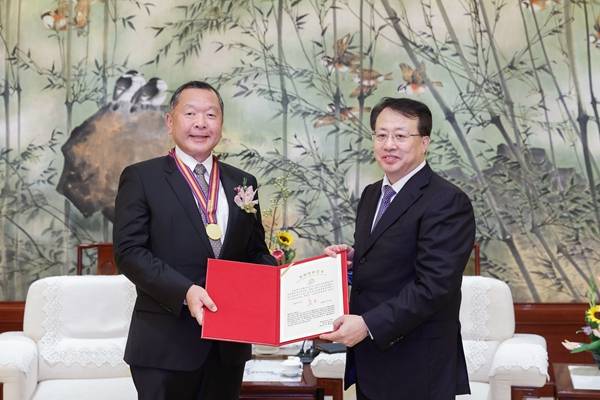
(Yasuteru Hirai [left] and Gong Zheng)
Over the past years, Hirai has been making efforts to promote the economic and trade relations between Japan and China. Under his leadership, Mitsubishi took over the Japanese Commodities Center which was on the edge of shutdown in 2012, and has since then introduced quality Japanese enterprises to Shanghai’s consumption market. Hirai said he will continue to contribute to Shanghai’s development.
Foreseeing China’s economic growth
Hirai joined Mitsubishi Corporation in April 1984. He was sent to Peking University to learn Mandarin from September 1987 to June 1988. “Feeling that China would play an important role in the world economy, I decided to learn Mandarin through the corporate system first,” replied Hirai when asked why he chose to work in China.
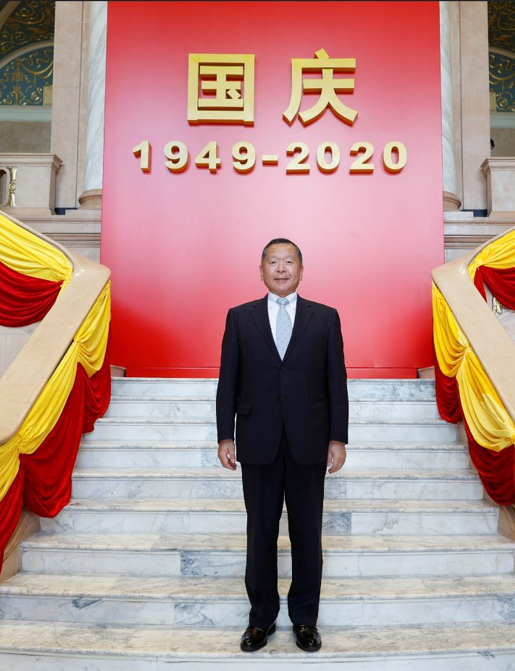
As Hirai recalled, back in the 1980s, it took at least 16 hours to travel from Beijing to Shanghai by train, “a thing that many young people today could not imagine at all”. Now it only takes around 4 hours. Hirai is impressed by the rapid growth of China’s economy, which is now the world’s second largest. Hirai said he was fortunate to have come to study Chinese and work in China, as what he had foreseen has become a reality.
As an international metropolis, Shanghai has played a crucial role in China’s reform and opening up. “Shanghai is a window to China; another of its strengths is its inclusiveness. It opens a window for the outside world and accommodates people from all over China.” Therefore, Hirai led Mitsubishi to take over the almost closed Japanese Commodities Center in 2012. “Shanghai’s opening up to the outside world has provided a platform for Japanese products to be introduced to the Chinese people. And the center needed someone from Japan to operate it. I think it would have been a pity if it shut down because no one was running it. So I determined to take the place. I did that not for personal benefits, but for introducing more Japanese enterprises to Shanghai and China. I wanted to see more people interested in Sino-Japanese exchanges.”
Promoting Sino-Japanese collaboration in fighting COVID-19
In early 2020 when COVID-19 broke out in China, Hirai, who was in Tokyo at that time, recorded a video to show his support to Shanghai, promising he would stand with the Shanghai people and do his best to help with Shanghai’s anti-epidemic efforts. Utilizing Mitsubishi’s global supply chain network, he managed to quickly gather 200,000 masks and sent them to Shanghai.
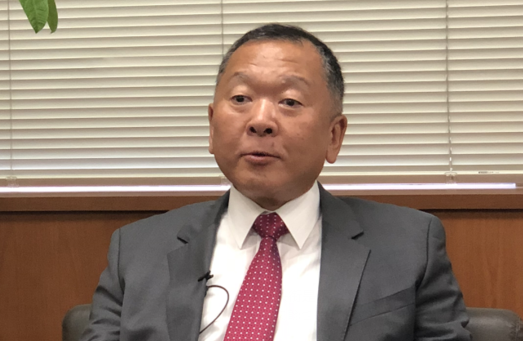
Hirai returned to Shanghai alone after learning that he could return to China, in order to lead his company’s resumption of work and production. At the same time, he introduced Shanghai and China’s anti-epidemic measures to his colleagues in Japan. As he said, the real anti-epidemic situation in China must be communicated to the world. During the time he was stuck in Japan, he kept close contact with his friends and colleagues in China, and spread China’s latest epidemic information to the world.
After Hirai returned to Shanghai, he had a business trip to Japan. This meant he has undergone concentrated quarantine twice, each time for 14 days, and has had five nucleic acid tests. Despite that, he has high praise for the quarantine measures of Shanghai. “Well done for the anti-epidemic measures at Shanghai’s airport and the quarantine hotel. I did not feel bad each time I came back to Shanghai. The staff at the airport were helpful and polite, so were the people at the quarantine hotel.”
“That represents Shanghai's openness and tolerance,” added Hirai. “The entire society, including expats, has reached a consensus to fight the epidemic together. I see the cohesion of Shanghai.”
Making continuous contributions to Shanghai
Many enterprises have been affected by COVID-19. Hirai said that it is very difficult to recover the economy while fighting the epidemic, as it demands a complete set of emergency response measures. Now, while the global economic market is hit by the pandemic, Shanghai’s economy is recovering rapidly thanks to having successfully contained the virus and a range of measures, like shopping festivals, night markets, and live-streaming on e-commerce platforms. Hirai believes this is an important opportunity for the whole country’s economic recovery.
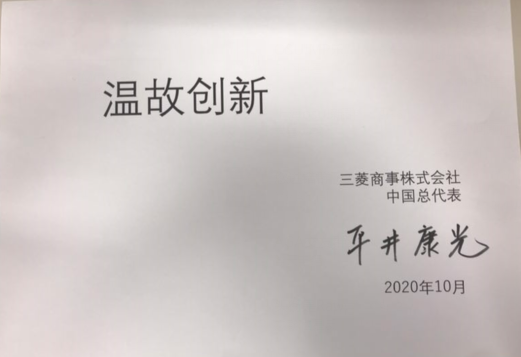
Over the years, Mitsubishi has carried out many social contribution activities in China. Since 2015, it worked with the China Foundation for Disabled Persons to jointly host the “Mitsubishi Friendship Cup,” a soccer tournament for players with impairments. It is also a sponsor of an autistic teenagers’ salon (an NGO) in Shanghai. In Beijing, Shanghai, Guangzhou and other places, it has provided scholarships for Chinese college students to study in Seikei University.
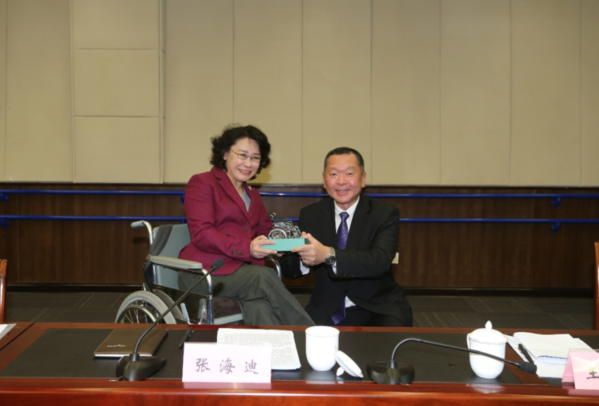
(Yasuteru Hirai and Zhang Haidi, chairwoman of China Disabled Persons’ Federation)
Hirai’s contributions to the city’s development won him a Shanghai Magnolia Silver Award in 2014 and a Magnolia Gold Award in 2017. This year, the medal and certificate of Honorary Citizen of Shanghai, which he regards as recognition from the city government and its people, has given him an even greater honor. As he said, Japan-China relations, in whatever field, must not become fragile under any circumstances. It is imperative to promote the economic and trade relations between the two countries. “While making contributions to Shanghai society, I will keep promoting Sino-Japanese economic exchange projects like the Japanese Commodities Center, and keep developing our China business. We must work harder to catch up with China’s development speed and develop with China,” vowed Hirai.
Story/Fan Yingliang, Cao Jun
Translation/Wu Qiong
